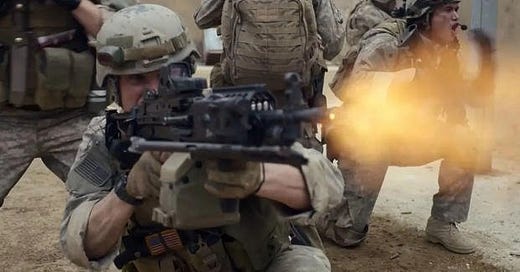Husband and I watched the movie “Warfare” in the theater last night. It is a reconstruction of the military operation of a platoon of Seals, from insertion to extraction, tasked with providing overwatch for Marines in Ramadi Iraq in 2006. It is only an hour and a half long.
We don’t know what the overall objective of their assignment was, so we don’t know whether they, or the Marines, achieved it. We simply see the details of a squad of soldiers performing their duty until they can’t anymore, and then leaving. By the end of the movie, they appear to have killed more of the enemy than have been killed by the enemy, but we are unable to judge whether they have made any progress.
That’s on purpose. The movie does not want us to evaluate what happens in terms of a specific war or specific objectives or politics. It allows us to make any evaluation we want to. But mainly it wants us to look at warfare itself, as experienced in a specific situation by a specific group of men.
Counter-intuitively, the movie uses the reconstruction (it’s not a documentary, and no, I can’t explain the difference between what I mean by reconstruction vs documentary) of an actual operation with specific men to show us warfare, abstracted from this specific war. And no, I can’t figure out how that works.
Unlike similar movies, such as “The Outpost” in Afghanistan or “Mosul” in Iraq, we don’t get to know anything about the soldiers in a non-war context. We learn nothing about their families or hopes or aspirations. We witness them only in the context of this single military operation.
Because of this, the focus is always and only on the man or men acting, or being acted upon. The film doesn’t move from “main character” to “secondary character” or “supporting character.” In fact, at any point the focus can turn to a character that seemed minor.
This seems true to the chaos of war. The focus always turns on the person who needs to act at the moment. This doesn’t mean that there is no leadership or command authority, but that even good command depends on those being led reacting as needed, both to the command and to the situation.
Because we get no non-war context for the soldiers, and because the movie is so short, it may not have as much of an emotional impact as “The Outpost” or “Mosul”.
On the other hand, eliminating the non-war context was helpful for me. I have trouble keeping characters straight, because it apparently takes me longer to tell people apart, especially when they all have very short hair and wear the same clothes. (This affects me in real life, too.) The non-war context, if too abbreviated, tends to just add to the confusion by giving me too much to keep track of before I can tell the characters apart physically.
It also takes me a while to connect names to faces, so it helped that there were not a lot of conversations where a character talked to someone about another character, which is common for establishing non-war context. Most communication was either over a radio, where I didn’t have to keep people straight, or it was face to face, so I knew who was talking to whom, even though I never learned most of the names.
I thought the acting was excellent.
Since I only had to concentrate on what each character was doing at the moment, it was easier for me to keep them straight, and focus on each man as an individual. Each one was affected in different ways and measures by the gore, the deafening noise of explosions (both expected and unexpected), witnessing extreme pain, the reactions of his team-mates, and so on.
The realism of the gore and pain was not for the faint of heart. But it was where and how (extremely graphic) it had to be. This was not “war porn.”
What do you think of how this movie depicted warfare?





I'm really looking forward to watching this movie. I appreciate both styles of telling war stories. Connecting us with their non-warrior lives helps us see them as people and has a place, but there is also a place for just the combat situation. It's good for me as a civilian to understand, even in the tiniest way, what the chaos of combat is like and what it requires of warriors.
Now I have to watch this movie, Ms. Mary. Most so-called war movies spend half, or more than half, of their screen time on romance or family life. It got where it was mostly romance in 50s war movies. Darby's Rangers and Lafayette Escadrille spent very little screen time on actual combat.
I think the problem lies with trying to reach a wider audience; audience satisfaction will fluctuate throughout with overall enjoyment being mediocre, IMHO. 🤷♂️